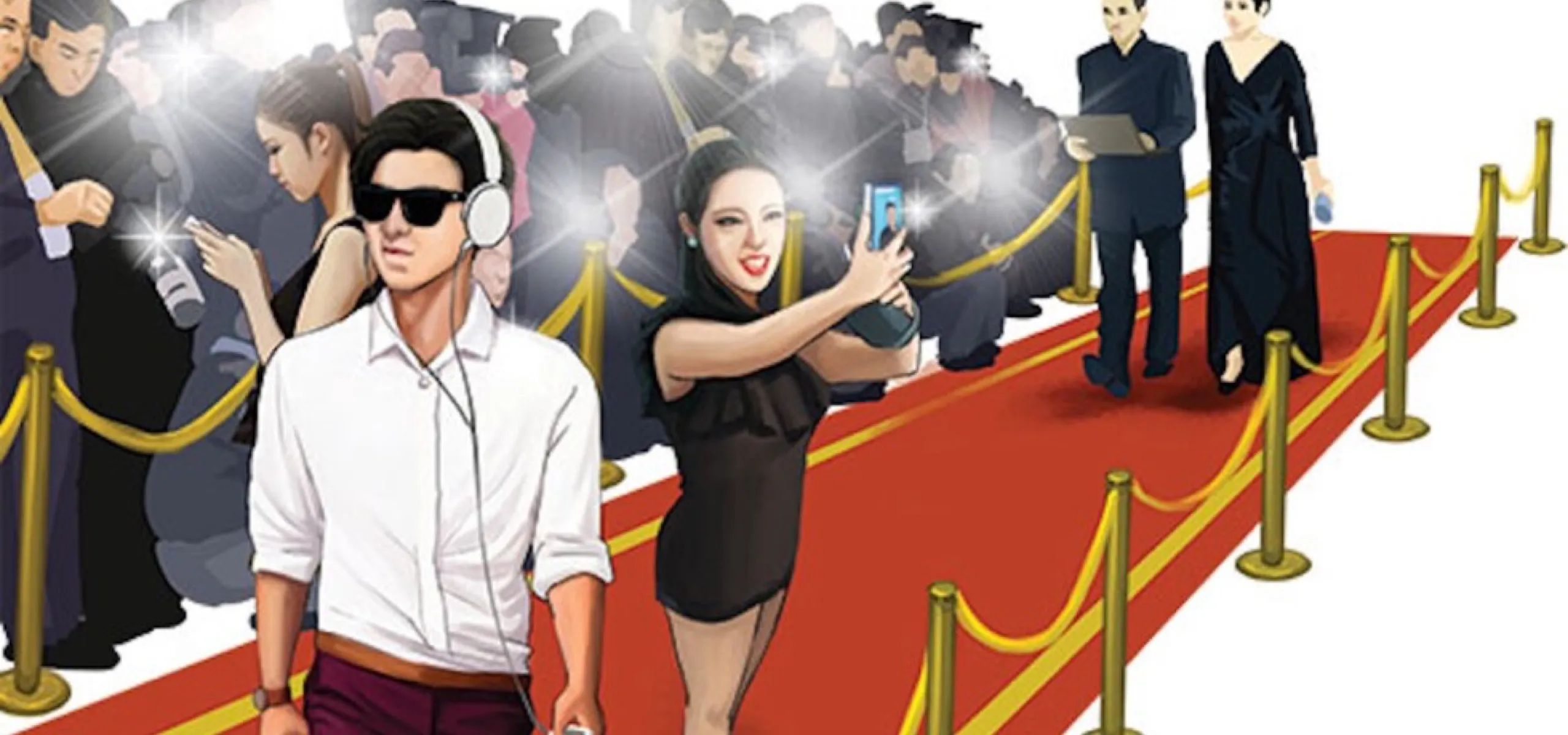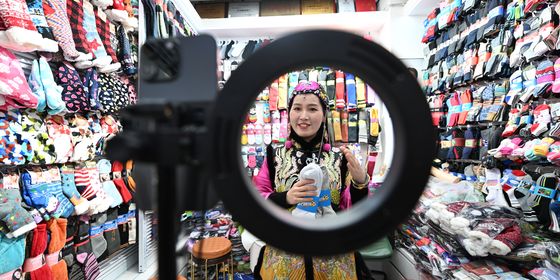Understanding the obsession with making and breaking online celebrities
Thin, V-shaped chin, huge eyes, supernaturally long eyelashes—when people see a girl with these features, they automatically reach for the phrase 网红脸 (wǎnghóngliǎn), or “internet celebrity face.” According to the stereotype, internet celebrities share this picturesque visage, with an unpleasant assumption they have had cosmetic surgery. They’re assumed to run online stores and to have fleeting romances with pop stars and the super rich.
Zhu Chenhui, allegedly the newest girlfriend of Wang Sicong (王思聪)—known for being the son of one of China’s richest men, Wang Jianlin (王健林)—is one of the newest online celebrities. She may just be the latest in a long line of conquests, but before the gossip exploded she had already earned some celebrity and huge profits online. Reports claim that Zhu is now making 150 million RMB this year through her Taobao store, more even than China’s richest actress, the famous Fan Bingbing, who earns around 128 million RMB a year.
But, becoming one of these lucky few isn’t easy, and while many manage to do it by accident, it is not an area yet governed by any field of economic science. In many ways, it’s like starting any business. You need to find your target audience, build up a unique personal brand, keep up constant communication with your followers (customers), and always remember to update regularly. In reality, it might take a team of experts to operate an account to make a Weibo look sufficiently humble and self-run.
However, if one is creative enough, they can just harness the imagination (and vanity) of hopeful web celebs. Hongshu (轰叔), born in 1992, gained more than one million followers on Weibo, and decided to start a very creative business: selling sweet potatoes online. But not just any sweet potatoes—sweet potatoes sold only to attractive people. Even Hongshu himself admited this was a little “bitchy,” but it worked. He’s a man that knows the internet. “Good-looking people feel superior to ugly people; but the point is everyone tends to think of themselves as good-looking,” Hongshu said in a speech.
Of course, the fastest way to success is sex appeal. Being pretty and fashionable is probably one of the easiest ways to become a grass-roots celebrity, giving these young and impressionable stars at least one skill: Photoshop. The prevalence of this ideal has resulted in the phrase, “online beauties only exist online” becoming cliché.
Others opt directly for plastic surgery, risking the before-after pictures that could, in the end, become their downfall.
And, as ever, where there is fame, there is money. Any large group of people, no matter how disparate, has commercial value. Whispering a quick, short quote into Weibo shouts at millions. Song Feifei, a marketing expert, says that marketing agencies pay these internet celebrities differently according to their number of followers, ranging from hundreds to thousands of RMB. “But they won’t necessarily accept your offer. They have to consider whether your product fits their image and whether they can manage to write some interesting content,” says Song.
To some extent, internet celebrities can turn their fame into influence and turn their influence into money.
“Not many people want to entertain the public online as a career,” says Li Shaoyong, 34, a grassroots celebrity agent working at the Beijing Gushan Cultural Company. Li used to be a joke writer and when his fans exceeded 50,000, people started coming to him, asking to insert their products into his jokes.
Now that he’s with the company, his major job is sifting through the growing numbers of online stars and employing them while they’re cheap.
With a whole team working behind him, online celebrities are more productive and can always generate new content and timely topics that interest the public to sustain their popularity a little bit longer.
There are any number of ways to become popular on the internet if you play your cards right. If you are neither pretty nor smart enough, then go for a pet. If you have a pet which is adorable enough, you need to do nothing but post photos or short films of your cutties, then you can be popular. “Red Little Fatty” (红小胖), for example, simply raised his pet and posted pictures of his fat little kitten that attracted more than 450,000 followers—which, by the way, is about the population of Malta. It just focuses on that particular cat. More cats can equal more followers. The “Mad Cat Lover” (大爱猫咪控), an account posting different kinds of cats, has more 1.6 million followers.
Followers mean market potential and even serve as a brilliant feedback tool. Often via selling cosmetics and clothes, these minor internet celebs are the lifestyle ideal for their casual fans. All these celebs have to do is post whatever product they’re meant to be marketing and in seconds they’ll have enough comments for a PR onslaught. Of course, with that many viewers, you don’t even need a promotion push—just post a link to your store.
Data from online retail platform Taobao shows that more than 1,000 Taobao shops are run by internet celebrities. During Single’s Day on November 11, China’s biggest online shopping day, seven out of the top ten hottest women’s clothing stores were owned by people whose only claim to fame was minor online celebrity.
Zhang Dayi, a former model and now the owner of an online shop, has more than three million fans on China’s Sina Weibo, which is more than most major film stars. It is said that thousands of this social media “It Girl” items are sold in seconds. Even what she wears in photos garners a barrage of comments asking her what brand she is wearing, as if the whole online world is a red carpet reporter.
Unlike the realms of film and music stardom, those like Zhang are from all walks of life, from models and independent designers to photographers and stylists. For many, it’s a short walk from internet celebrity to an entrepreneur with their own brand and investment capital flowing into their coffers. “Since the latter half of last year, we have noticed some of the women’s clothing shops on Taobao are quite different from others. Those shops have turned into blogs; the clothes are independently designed and money is made this way,” director of Taobao’s clothing division, Jin Ke, said in an interview with China.org.cn.
In most contexts, the word “internet celebrity” is associated with Taobao shop owners, and in a broader sense, it generally refers to guerilla marketing. Obviously, the realm of internet celebrity isn’t just populated by fashion icons and beautiful schmoozers; in the age of the internet, anything can become famous, and every bit of that fame is valuable.
This strange equation of followers equaling money is perhaps a relatively new addition to the economy, though one shudders to think how someone can be taught to be an internet celebrity. The fact remains, however, that while people casually peruse their social media feeds, they are, perhaps inadvertently, inspiring a generation of would-be entrepreneurs. This odd economy is perhaps made even stranger by the fact that some become famous accidentally and others use the pretense of shame to gain notoriety. In the end, it is a transaction: netizens are entertained by their interest, hormones, or need to shame others, and those same celebrities use their followers to make money. That’s China’s online-celebrity economy. It would appear that this is the modern price for conversation, one that, with time, has experienced serious inflation.
“Internet Superstar” is a feature story from our issue, “Internet Celebrity.” To read the whole piece, become a subscriber and receive the full magazine. Alternatively, you can purchase the digital version from the iTunes Store.












